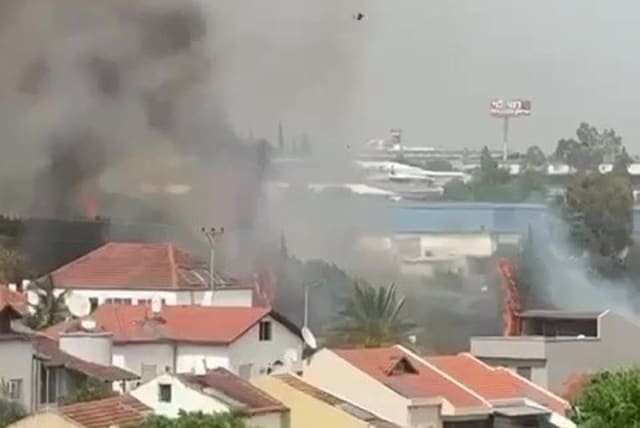Government approves relief plan for evacuees as north burns from Hezbollah rockets

Hezbollah attacks continued against northern Israel on Monday, sparking several wildfires and damaging several buildings.
The government approved a budget of NIS 3.5 billion for a plan to rehabilitate northern Israel and help evacuees on Monday, months after the government promised to approve such a plan.
The plan, known as the "Northern Dawn" outline, includes a budget of NIS 3.5 billion for the near term and NIS 3 billion for a multi-year plan. In 2024, a budget of NIS 940 million will be allocated for the outline.
A dedicated headquarters will be established in the Prime Minister's Office to promote the implementation of the outline and formulate an outline to rehabilitate and develop the north. A ministerial committee on the matter will also be headed by Prime Minister Benjamin Netanyahu.
The plan will apply to towns within nine kilometers of the border. The plan aims in the near term to increase certainty for the region, provide aid to keep the evacuated communities together and bring them closer to the north, assist in maintaining the functional continuity of businesses and strengthen affected industries, strengthen the operations of local authorities, and collect information for decision-making.
In the long term, the plan will include efforts to strengthen businesses and factories, support innovation, strengthen resilience in the field of electric supply such as with solar panels and biogas generators, strengthen mental health support, strengthen education services, establish a university in Kiryat Shmona, rehabilitate the tourism industry, and improve health services in the region, among other measures.
The plan will also require the Education Ministry to prepare plans for the schools in areas currently evacuated to open as normal for the school year that starts in September and to prepare options for evacuees who will not be able to return to their homes for security reasons.
Moshe Davidovich, the head of the Mateh Asher Regional Council and chairman of the Confrontation Line Forum, welcomed the decision, noting it came after eight months of efforts by local leaders to get the government to act.
Davidovich added that local leaders from the north held a "significant meeting" with Prime Minister Benjamin Netanyahu last week, going section by section through the various issues. The regional council head said the approval of the plan marked "positive progress," adding "the Israeli government should give hope to the evacuees and the residents of the entire confrontation line, and provide immediate benefits that will minimize and curb the phenomenon of the residents' abandonment so that they can return home safely."
Davidovich called on the government to act to bring the evacuees from the north home and restore security in the north.
Earlier this month, Davidovich said that Netanyahu had promised during a meeting in January that the plan just approved on Monday was going to be publicized within ten days. Over five months after, the plan has now been publicized and approved.
Local leader announces severance of all ties with national government
While Davidovich welcomed the approval of the plan on Monday afternoon, on Monday morning, the head of the town of Margaliot, located near the Lebanese-Israeli border, announced that his town would be cutting off all contact with the government and kicking out soldiers present in the town.
The head of Margaliot, Eitan Davidi, announced that the town would be closing its entrance gate and not letting anyone in or out, including the army. "Margaliot does not need to be protected from Hezbollah but from the Israeli government which crushes the town with its decisions," said Davidi. "Margaliot is directly affected by the decisions of the government and the Agriculture Ministry that cause greater damage than Hezbollah's anti-tank missiles."
As the government approved the plan on Monday, Hezbollah rocket, missile, and drone attacks continued against northern Israel, sparking several wildfires and damaging several buildings.
An anti-tank missile fired by Hezbollah hit a home in Metula. No injuries were reported in the incident.
Earlier in the day, the IDF eliminated a Hezbollah terrorist in a strike in Aynata in southern Lebanon near a site where projectiles were launched from toward Malkia.
Additionally, on Monday, Lebanese media reported that two members of Hezbollah were killed in an IDF strike next to a hospital in Bint Jbeil in southern Lebanon.
Between 30-40 rockets were fired towards the Meron area on Monday afternoon as well. The IDF struck the launchers where the rockets were fired from.
On Monday evening, about 25 rockets were fired toward the Kiryat Shmona area. The rocket fire toward Kiryat Shmona sparked several wildfires throughout the day, with 15 firefighting teams working to fight the blazes. Several houses throughout Kiryat Shmona were damaged by direct hits by rockets.
Hezbollah claimed responsibility for 10 attacks throughout the day along the border.
Jerusalem Post Store
`; document.getElementById("linkPremium").innerHTML = cont; var divWithLink = document.getElementById("premium-link"); if (divWithLink !== null && divWithLink !== 'undefined') { divWithLink.style.border = "solid 1px #cb0f3e"; divWithLink.style.textAlign = "center"; divWithLink.style.marginBottom = "15px"; divWithLink.style.marginTop = "15px"; divWithLink.style.width = "100%"; divWithLink.style.backgroundColor = "#122952"; divWithLink.style.color = "#ffffff"; divWithLink.style.lineHeight = "1.5"; } } (function (v, i) { });
